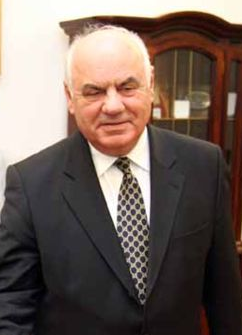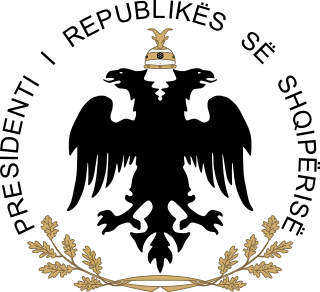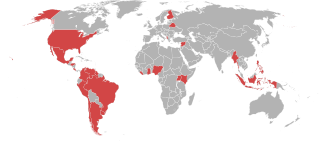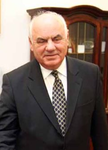Albania is a unitary parliamentary constitutional republic, in which the president of Albania is the head of state and the prime minister of Albania is the head of government in a multi-party system. The executive power is exercised by the Government and the prime minister with its Cabinet. Legislative power is vested in the Parliament of Albania. The judiciary is independent of the executive and the legislature. The political system of Albania is laid out in the 1998 constitution. The Parliament adopted the current constitution on 28 November 1998. Historically Albania has had many constitutions. Initially constituted as a monarchy in 1913, Albania became briefly a republic in 1925, and then a authoritarian monarchy in 1928. In 1939 Albania was invaded by Fascist Italian forces, imposing a puppet state, and later occupied by Nazi German forces. Following the partisan liberation from the Nazis in 1944 a provisional government was formed, which by 1946 had transformed into a communist one-party state. In March 1991 democracy was restored with multi-party elections.

Alfred Spiro Moisiu is a former Albanian military general, diplomat and politician. He was the president of Albania from 2002 to 2007. He is the oldest son of Albanian Army general Spiro Moisiu.

The prime minister of Albania, officially the prime minister of the Republic of Albania, is the head of government of Albania. The office of the prime minister is a core institution in the politics of Albania formed after the Albanian declaration of independence on 28 November 1912. Since that time, the nation has navigated a dynamic political evolution spanning distinct periods, encompassing a monarchy, a communist regime and the eventual democratic order. In 1912, Ismail Qemali was inaugurated as the first prime minister of Albania, guiding the nation towards sovereignty amidst the complex conditions in the Balkans. In 1944, Enver Hoxha implemented a radical change, directing Albania into an authoritarian and isolationist communist regime. In 1991, the nation adapted to a democracy that marked a notable shift, when Fatos Nano emerged as the first post-communist prime minister of Albania.

Sali Ram Berisha is an Albanian cardiologist and conservative politician who served as the president of Albania from 1992 to 1997 and 32nd prime minister from 2005 to 2013.

The president of Albania, officially styled the President of the Republic of Albania, is the head of state, commander-in-chief of the military and the representative of the unity of the Albanian people.

Fatos Thanas Nano is an Albanian socialist politician who served as Prime Minister of Albania in 1991, from 1997 to 1998 and from 2002 to 2005. He was the first leader and founder of the Socialist Party of Albania and a member of the Albanian Parliament from 1991 to 1993 and 1997 to 2009. He reformed the anti-revisionist Marxist-Leninist ideology of the Labor Party of Albania into social democracy for its successor, the Socialist Party. During his leadership, the Socialist Party, as a result of reforms, joined the Socialist International and Party of European Socialists. Nano was a candidate in the 2007 presidential election but did not win. He again tried in the 2012 presidential election, but he did not even qualify as a candidate, because the leaders of parties in Parliament obstructed their respective MPs to elect him as candidate in the elections.

Ilir Rexhep Meta is an Albanian politician. He served as the president of Albania from 24 July 2017 to 24 July 2022.
Bashkim Fino was an Albanian socialist politician who served as the 29th Prime Minister of Albania from March to July 1997.
Indirect presidential elections were held in Albania on 20 and 27 June, 8, 11, 14, and 20 July, the sixth such elections since the collapse of the communist regime in 1991.
In 1991, the Socialist Party of Albania, with specific social democratic ideology took control of the country through democratic elections. One year later the Democratic Party of Albania won the new elections. After 1990, Albania has been seeking a closer relationship with the West. What followed were deliberate programs of economic and democratic reform, but the implementation of capitalism led to the proliferation of pyramid schemes. Chaos in late 1996 to early 1997, as a result of the collapse of these pyramid schemes, alarmed the world and prompted the influx of international peacekeeping forces. In 1995, Albania was accepted into the Council of Europe and requested membership in NATO and is a potential candidate country for accession to the European Union. The workforce of Albania has continued to emigrate to Western countries, especially Greece and Italy.
Albania does not currently recognize same-sex marriages or civil unions. A bill to legalize same-sex marriage had been introduced to Parliament in 2009, but was never voted on.
Indirect presidential elections were held in Albania on 30 May, 4, 8 and 11 June 2012, the seventh such elections since the collapse of the communist regime in 1991. The first through third rounds of voting were inconclusive. The fourth round resulted in the incumbent party's member Bujar Nishani being elected as President.
The following lists events that happened during 2005 in the Republic of Albania.
Indirect presidential elections were held in Albania on 19, 20, 27 and 28 April 2017, the eighth such elections since the collapse of the communist regime in 1991. In the first through third round, no candidates were proposed and no vote took place in the Parliament of Albania. In the fourth round, the incumbent Chairperson and former Prime Minister of Albania, Ilir Meta was elected as the seventh President of Albania with 87 votes.
Indirect presidential elections have taken place in Albania from 16 May 2022 to 4 June 2022. It was the ninth presidential election since 1991 and the collapse of the communist regime.
The parliament of Kosovo is due to hold an indirect election for president of Kosovo on or before 2026, with a second or third round of voting if necessary.

A natural-born-citizen clause is a provision in some constitutions that certain officers, usually the head of state, must be "natural-born" citizens of that state, but there is no universally accepted meaning for the term natural-born. The constitutions of a number of countries contain such a clause but may define or interpret the term natural-born citizen differently. Many countries specify citizenship since birth as a requirement to hold certain offices. This is often described using the natural born phraseology and sometimes further qualified as requiring physical birth within the country's territory and/or requiring that one or both natural parents be a citizen of the country at the time of birth.

The first Government of Prime Minister Sali Berisha was the 63rd ruling Government of the Republic of Albania formed on 8 September 2005. Following the 3 July 2005 election, the Democratic Party formed a center-right post-electoral alliance to make a majority of seats to Parliament and form the government. The alliance consisted of five-center-right parties led by Sali Berisha managed to create a majority of 81 deputies out of 140 in the Assembly. The new government led by Sali Berisha was voted on 8 September with 84-votes Pro, and took oath on 11 September in the presence of the President of the Republic Alfred Moisiu.

The Second Government of the Prime Minister Ilir Meta was the 60th Government of the Republic of Albania which was officially mandated by President Rexhep Meidani on 7 September 2001. After the 2001 election, the alliance led by the Socialist Party won the majority for the second time in a row and managed to create a post–electoral coalition of 86 seats in Parliament to form the new government.

The Majko II Government was the 61st ruling government of the Republic of Albania, led by prime minister Pandeli Majko. It was officially mandated by president Rexhep Meidani on 22 February 2002. After the 2001 parliamentary elections, the alliance led by the Socialist Party won a seat majority for the second consecutive time and managed to form a government headed by Ilir Meta but due to internal conflicts within the party, Meta was forced to offer his resignation on 29 January 2002. Majko managed to persuade most of the party hierarchy, including its chairman Fatos Nano, to form a new government, although as it turned out, for the same reasons as the Meta II Government, he offered his resignation a few months later on 25 July 2002.










